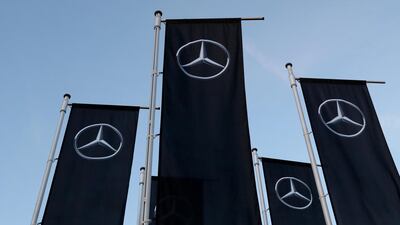Daimler on Wednesday said profit would fall in 2018 as new import tariffs on cars exported from the United States to China would hurt sales of high-margin Mercedes-Benz sports utility vehicles.
Daimler earnings before interest and taxes (EBIT) would now be slightly below the previous year's level, rather than slightly above, the company said in a regulatory filing late on Wednesday.
Daimler's revised forecast comes as US President Donald Trump is proposing to impose tariffs on imported vehicles on grounds that trade imbalances on many products threaten US national security.
He is separately promising to impose tariffs on up to $200 billion of Chinese goods. China has warned it would retaliate with levies on US products, potentially including the Mercedes-Benz sport utilities shipped to China from Alabama.
Separately on Wednesday, the chief executive of Volvo Cars warned that higher tariffs could undermine the Chinese-owned automaker's plans to hire up to 4,000 workers at a new vehicle assembly plant in South Carolina.
Stocks in a wide range of companies have see-sawed in recent weeks as investors tried to assess the risk to corporate profits from the Trump administration's trade policy.
_____________
Read more:
Trump urges EU to enter talks to lower trade barriers
European leaders back Trudeau in G7 aftermath and criticise Trump
_____________
Daimler is one of the biggest global companies to cut its profit outlook and blame trade tensions. The German industrial firm's revised forecast came on the same day as reports that German automakers backed a proposal that the European Union drop tariffs on vehicles to defuse trade tensions.
While the United States and China have not yet imposed new tariffs, Daimler said it expects that to occur, and that the automaker will not be able to recover the costs from customers.
"Fewer-than-expected SUV sales and higher-than-expected costs, not completely passed on to the customers, must be assumed because of increased import tariffs for US vehicles into the Chinese market," it said in a regulatory filing.
Daimler also said a new vehicle certification process based on stricter fuel efficiency test procedures will hit sales in the second half of the year, and warned that earnings at its Mercedes-Benz Vans unit would suffer because of a vehicle recall for diesel-engined models.
Daimler was ordered last month to recall its Mercedes-Benz Vito vans fitted with 1.6 litre diesel engines because Germany's motor vehicle authority, KBA, said they breached emissions rules. Daimler has said it will appeal the decision.
As a result, EBIT at its Mercedes-Benz Cars division would now be slightly below the previous year, and significantly below the previous year's level in the vans division, Daimler said.
South Korean automakers fell in morning trade on Thursday, while Japanese peers gained moderately, paring earlier losses.
Japanese and South Korean automakers for the most part do not ship vehicles made in the United States to China. Most of the vehicles sold in China are made locally through their Chinese joint ventures, along with imports from Asia.
But analysts said the US trade spat with China raises concerns about knock-on effects on other countries, like potential US auto tariffs on all vehicle imports.
"South Koreans have higher portions of vehicle imports in the US than peers, making them vulnerable to US potential tariffs," Kwon Soon-woo, an analyst at SK Securities, said.
Kia Motors fell as much as 2.9 per cent, while Hyundai Motors fell as much as 1.9 per cent to their lowest levels in over 28 months.

